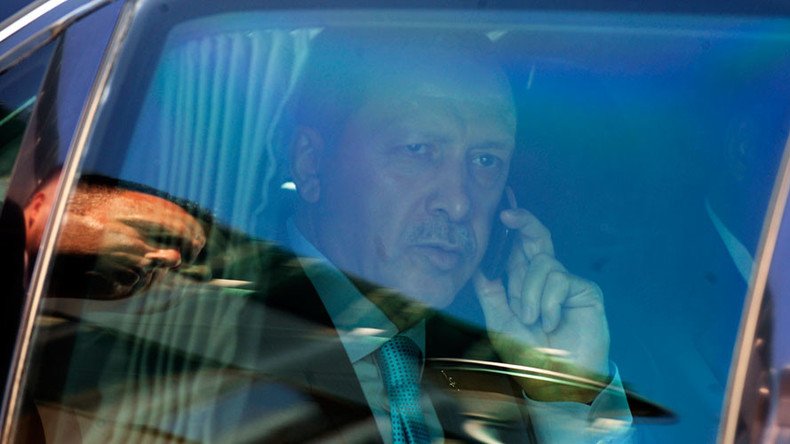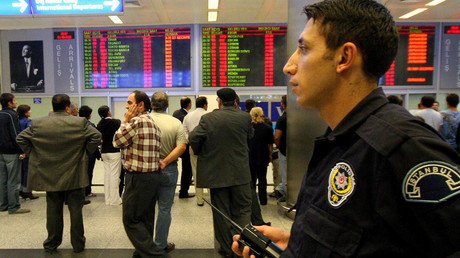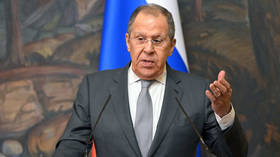10 amazing things about Turkey's failed coup

In a dramatic turn of events, Turkish President Tayyip Erdogan cut short a vacation with a night flight back to Istanbul, rebel jets trailing the presidential plane, to rally his people to his side with every tool at his disposal - even social media.
10. Erdogan managed to fly to Istanbul at height of crisis
Erdogan, upon hearing news of an attempt to overthrow his government, boarded his private jet and made a daring flight from the Mediterranean resort of Marmaris to Istanbul. To add suspense to this political theater, his aircraft was tailed by two jets being piloted by rebel supporters. Yet Erdogan’s plane was never fired upon and the Turkish leader landed safely in Istanbul where he rallied the country to his side.
"At least two F-16s harassed Erdogan's plane while it was in the air and en route to Istanbul. They locked their radars on his plane and on two other F-16s protecting him," a former military officer with knowledge of the events told Reuters.
"Why they didn't fire is a mystery," he said.
Did the rebel pilots get cold feet in the heat of the moment?
9. Turkey attempts to block massive Wikileaks release
And they failed. Massively. Despite efforts on the part of Ankara to block access to a mother load of government emails, covering the period from 2010 up until July 6, 2016, WikiLeaks managed to flush 294,548 emails into the public pipeline.
RELEASE: 294,548 emails from Turkey's ruling political party, Erdoğan's AKP #AKPemailshttps://t.co/1Yof7YZpH7pic.twitter.com/vFw8KLMIsX
— WikiLeaks (@wikileaks) July 20, 2016
“WikiLeaks has moved forward its publication schedule in response to the [Turkish] government's post-coup purges,” WikiLeaks said in a press release.
“We have verified the material and the source, who is not connected, in any way, to the elements behind the attempted coup, or to a rival political party or state,” added the whistleblowing site, which has said that it does not take any sides in the crisis, but rather serves "the truth."
Erdogan may be forgiven for questioning Wikileaks' claim of impartiality (the emails released were attributed to ‘akparti.org.tr’, the primary domain of the Turkish government).
The leaked documents could ultimately prove severely embarrassing for the Erdogan government, not to mention Ankara's allies, which has allowed US-led NATO forces conducting an illegal war against Islamic State forces in Syria to use Turkish territory as launch pad for the aggression. There have also been rumors that the Erdogan government, at the very least, knew about Islamic State oil entering its territory where it moved on to the black market.
8. Turkey declares state of emergency
Erdogan said on Wednesday he would introduce a three-month state of emergency following the failed coup attempt. The Turkish leader, responding to criticism that the move might violate civil liberties, said the decision would not violate any democratic freedoms.
"The purpose of the state of emergency is to most effectively and swiftly take steps necessary to eliminate the threat to democracy in our country," he said, as quoted by Anadolu Agency.
By declaring a state of emergency, the Turkish government may override parliament – which, incidentally, suffered an attack by rebel fighter jets during the coup attempt - and push through new laws. Some civil liberties may also be limited or suspended if the government decides to do so, the news agency added.
Erdogan is “playing his last card” in an attempt maintain control over his country, Dr. Maged Botros, professor of political science at Helwan University, Cairo, told RT.
“Erdogan wants to revive the Ottoman Empire … so internally he needs a very tight grip on the country, on the state, on the branches of government,” Botros added.
Meanwhile, a travel ban has been placed on all Turkish academics wanting to go abroad. Will some of these individuals be swept up as Erdogan attempts to clean house?
7. Exiled cleric denies any involvement in coup
Erdogan’s government is continuing with a crackdown on followers of US-based Fethullah Gülen, the reclusive cleric the Turkish government believes is responsible for the coup attempt.
Gulen’s movement, known as Hizmet, is said to have a large following across the country, with supporters holding key positions in various government institutions - from schools and security forces, up to and including the ruling AKP party.
However, Fethullah Gülen, who has been living in exile in the US state of Pennsylvania since 1999, not only denied any involvement in the coup, but said it may have been “staged” by the Erdoğan regime.
“I don’t believe that the world believes the accusations made by President Erdoğan,” Gülen told a small group of journalists. “There is a possibility that it could be a staged coup and it could be meant for further accusations [against Gülen and his followers].”
This begs the question: Had the coup succeeded to overthrow Erdoğan would Gülen have been boarding a plane back to Turkey?
“Indeed, I miss my homeland a lot,” he was quoted by The Guardian as saying. “But there is another important factor, which is freedom. I am here, away from the political troubles in Turkey and I live with my freedom.”
Although Erdogan has claimed Gulen is the organizer of the coup, he reportedly has never made a formal request to the US to extradite the reclusive cleric. However, there are reports that in fact Erdogan’s government has requested Gulen’s extradiction from the US, requests that have allegedly gone ignored by the Americans.
6. Speedy roundup and arrest of rebel opposition
A purge of suspected Gulen supporters is now underway, with thousands already rounded up. Many observers are questioning how these individuals were discovered so quickly, in a matter of just days.
I added numbers of sacked employees in 5 days of crackdown based on official statements: 67,473 employees sacked as of this hour.
— Mahir Zeynalov (@MahirZeynalov) July 20, 2016
The government’s rapid containment of the coup has even led conspiracy theorists to suggest that Erdogan scripted the entire event so as to tighten his grip on power while purging the government and military of Gülen's influence.
At least one senior Turkish official from the presidency rejected rumors of an Erdogan-hatched coup.
“It is really disrespectful to see people who haven’t been here, who haven’t seen what the putschists did, just from the comfort of their homes, pass judgment and spread rumors about what happened in Turkey,” the official told The Jerusalem Post on Monday.
Meanwhile, the Turkish president has not ruled out ordering the execution of the participants of last week’s failed military coup, even though such a dramatic settling of scores would end forever Turkey's dream of joining the European Union.
“The people have the opinion that these terrorists should be killed,” Erdoğan said in interview for CNN following his brush with political demise. “Why should I keep them and feed them in prisons for years to come? That’s what the people say.”
‘Yes’ to death penalty will mean ‘No’ to EU membership, EU warns Turkey https://t.co/wQa93ehTlhpic.twitter.com/vBXn1ELFlp
— RT (@RT_com) July 19, 2016
5. Erdogan’s social media countercoup
The Erdogan government, which has complained about social media in the past, was not shy about using the virtual tool to nip the coup in the bud and condemn the enemies of the state.
The Turkish leader, for example, led a hi-tech counter coup via phone carriers. According to Bloomberg: “At 2:22 a.m. local time on Saturday, while the coup was still under way, [Erdogan] texted customers of Turkcell Iletisim Hizmetleri AS, exhorting them to ‘take over the streets and your nation against this narrow cadre.’”
Later, a sms message from the Turkish government invited Vodafone Group Plc customers to relish in the defeat of the coup.
Turkcell CEO Kaan Terzioglu told Haberturk TV that the company helped Erdogan and Prime Minister Binali Yildirim get their messages out after coup organizers tried to destroy a satellite-TV facility they were using to reach the public.
Finally, President Erdogan used the iPhone’s FaceTime service from his private jet to inform his followers that he was alive and still very much in charge.
Apparently Erdogan's new feelings about social media is, 'if you can't beat them, join them, and then arrest them en masse.'
4. No NATO to the rescue
Some observers found it incredible that there was no NATO assistance forthcoming during the attempted coup, and despite the fact that Turkey is housing 50-90 US nuclear bombs at Incirlik airbase that could fall into the hands of a rebel opposition with unknown credentials.
3. Turkey blames US for ‘involvement’ in failed coup
Now this is where things start to get, as Facebook would describe it, complicated. The Turkish government has indirectly criticized the US for failing to turn over Fethullah Gülen, whom Ankara blames for masterminding last week’s military coup attempt.
Indeed, the aftermath of the failed coup has overnight exposed a rift in US-Turkish relations, which could have repercussions to everything from the Syrian civil war to Turkey’s NATO partnership.
“I do not see any country that would stand behind this man, this leader of the terrorist gang, especially after last night. The country that would stand behind this man is no friend to Turkey. It would even be a hostile act against Turkey,” Prime Minister Binali Yıldırım told reporters in a thinly veiled rebuke of the United States.
Speaking in Brussels, US Secretary of State John Kerry “urged”his Turkish counterpart to provide evidence of Mr Gulen’s role, “not allegations”.
Kerry told Turkish Foreign Minister Mevlut Cavosoglu last week that claims of US involvement in Turkey’s failed coup "hurt relations" between the two countries, State Department spokesman John Kirby said.
2. Will Turkey give up its NATO membership?
The coup has placed a large question mark on the Turkey-NATO relationship. Turkey, with the second-largest standing army in the alliance, is now attempting to separate friends from opportunists from outright enemies. How it will finally settle accounts is anybody's guess. Yes, Turkey has been a faithful member of the North Atlantic Treaty Organization since 1952, but there is nothing these days that is so unpredictable as an alliance. Britain proved that as it voted in favor of a Brexit, while George W. Bush in 2002 excused his country from the Anti-Ballistic Missile Treaty, which had kept the peace between the world's two largest nuclear powers for 30 years. So do not be surprised if the 28-member military bloc loses one of its most vital partners in the months to come.
1. Erdogan-Putin set to meet in August
This is certainly the most unexpected and most anticipated political event of the year. Turkish-Russian relations appeared doomed for many years of toil and hardship after Turkey F-16s, on November 24, 2015, shot down a Russian fighter jet that was carrying out anti-terrorist operations inside of Syria. What a difference a night can make. Although a bilateral thaw was already underway after Erdogan, coming as close to giving Putin a formal apology for the unfortunate shoot down as politically possible, Turkey's failed military coup has flipped the geopolitical chessboard, and now - much to the consternation of Washington and Brussels - Erdogan and Putin are scheduled next month for a political pow-wow (emphasis on the 'wow') next month.
Hold your bets, things just got a lot more interesting at the geopolitical poker table.
The statements, views and opinions expressed in this column are solely those of the author and do not necessarily represent those of RT.















